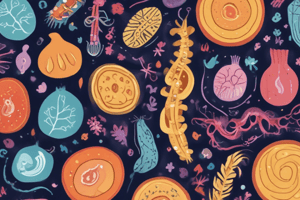Podcast
Questions and Answers
Which organ in the body is responsible for the inactivation of salivary amylase during carbohydrate digestion?
Which organ in the body is responsible for the inactivation of salivary amylase during carbohydrate digestion?
- Pancreas
- Liver
- Stomach (correct)
- Small intestine
Which type of carbohydrate is not digested in the small intestine?
Which type of carbohydrate is not digested in the small intestine?
- Starch
- Glucose polymers
- Fibre (correct)
- Disaccharides
Which enzymes are responsible for digesting maltose, sucrose, and lactose in the small intestine?
Which enzymes are responsible for digesting maltose, sucrose, and lactose in the small intestine?
- Salivary amylase
- Intestinal cells (correct)
- Pancreatic amylase
- Bacterial enzymes
Which transporter is responsible for the absorption of fructose in the small intestine?
Which transporter is responsible for the absorption of fructose in the small intestine?
What impacts the rate of absorption of carbohydrates?
What impacts the rate of absorption of carbohydrates?
Which chapter in the book 'Nutrition and Metabolism' discusses carbohydrate digestion and absorption?
Which chapter in the book 'Nutrition and Metabolism' discusses carbohydrate digestion and absorption?
Which organ in the body surrounds a substance forming a vesicle during active transport?
Which organ in the body surrounds a substance forming a vesicle during active transport?
Which type of transport occurs down its concentration gradient facilitated by a membrane-bound transport protein?
Which type of transport occurs down its concentration gradient facilitated by a membrane-bound transport protein?
Which type of transport involves the movement of water?
Which type of transport involves the movement of water?
Which organ in the body is responsible for the digestion of carbohydrates using salivary amylase?
Which organ in the body is responsible for the digestion of carbohydrates using salivary amylase?
Which enzyme inactivates salivary amylase during carbohydrate digestion?
Which enzyme inactivates salivary amylase during carbohydrate digestion?
Which type of carbohydrate delays gastric emptying?
Which type of carbohydrate delays gastric emptying?
Which transporter is responsible for the absorption of all three monosaccharides in the small intestine?
Which transporter is responsible for the absorption of all three monosaccharides in the small intestine?
What impacts the rate of absorption of carbohydrates?
What impacts the rate of absorption of carbohydrates?
Which book chapter discusses carbohydrate digestion and absorption?
Which book chapter discusses carbohydrate digestion and absorption?
Which organ in the body surrounds a substance forming a vesicle during active transport?
Which organ in the body surrounds a substance forming a vesicle during active transport?
Which type of transport occurs down its concentration gradient facilitated by a membrane-bound transport protein?
Which type of transport occurs down its concentration gradient facilitated by a membrane-bound transport protein?
Which enzymes are responsible for digesting maltose, sucrose, and lactose in the small intestine?
Which enzymes are responsible for digesting maltose, sucrose, and lactose in the small intestine?
Which type of transport involves the movement of water?
Which type of transport involves the movement of water?
On a scale of 1 to 5, how difficult was this lecture?
On a scale of 1 to 5, how difficult was this lecture?
Flashcards are hidden until you start studying
Study Notes
Carbohydrate Digestion and Absorption
- The stomach is responsible for the inactivation of salivary amylase during carbohydrate digestion.
- Fiber is the type of carbohydrate that is not digested in the small intestine.
- Enzymes such as maltase, sucrase, and lactase are responsible for digesting maltose, sucrose, and lactose in the small intestine.
Carbohydrate Absorption
- The GLUT5 transporter is responsible for the absorption of fructose in the small intestine.
- The rate of absorption of carbohydrates is impacted by factors such as surface area, concentration gradient, and blood flow.
Cellular Transport
- The liver is the organ that surrounds a substance, forming a vesicle during active transport.
- Facilitated diffusion is the type of transport that occurs down its concentration gradient, facilitated by a membrane-bound transport protein.
- Osmosis is the type of transport that involves the movement of water.
Additional Facts
- The mouth is the organ responsible for the digestion of carbohydrates using salivary amylase.
- Pepsin is the enzyme that inactivates salivary amylase during carbohydrate digestion.
- Fiber is a type of carbohydrate that delays gastric emptying.
- The SGLT1 and GLUT2 transporters are responsible for the absorption of all three monosaccharides in the small intestine.
- Chapter 4 in the book 'Nutrition and Metabolism' discusses carbohydrate digestion and absorption.
Studying That Suits You
Use AI to generate personalized quizzes and flashcards to suit your learning preferences.




